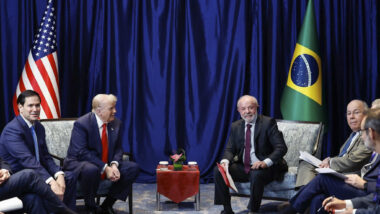
Ouça este conteúdo
What is the proper role of courts in a democracy?
After centuries of experience with democracy, there is no easy answer and this simple question still confounds democracies all around the world. When government is divided, as it is in the United States and in Brazil, the problem arises with frequency.
In the United States, a conservative Supreme Court has invalidated several of President Biden’s policies on grounds that they exceeded his authority under the Constitution. There have been calls to take power away from the Supreme Court or remake it. Court legitimacy is at an all-time low.
In Brazil, a justice of the Brazilian Supreme Court recently overturned a statute (passed in 2013) that regulated the gold mining industry based on appeals to principles like the rights of indigenous people and to a clean environment. In response, the Brazilian Senate is considering a constitutional amendment to take away this power.
The role of the Supreme Court in both countries is in dispute.
As a starting point, democracy means majority rule. The people get to vote on who they want in charge, and knowing they can be turned out by voters if they do a bad job, politicians have incentives to adopt popular policies. Congress is supposed to be where law is made. Elections matter, as President Barack Obama famously quipped.
But giving majorities power to make the laws means also giving them the power to make laws that favor the many at the expense of the few. In the extreme, political majorities could simply take the wealth of the minority, ban minority religious or cultural practices, or otherwise make life miserable for them. Society as a whole would suffer.
What is the proper role of courts in a democracy? After centuries of experience with democracy, there is no easy answer and this simple question still confounds democracies all around the world
Of course, minorities can oppress majorities too. A small faction could seize control of the government through influence peddling, and put in place policies that reward the connected few over the many. Voter apathy or ignorance is fertile ground for minorities to seize power. Both Brazil and the United States have seen this happen all too often.
To paraphrase one of America’s founders, men are not angels, which is why we need government, but politicians are not angels either, which is why we need a system that checks itself.
To address the problem of legislatures abusing their power, democracies generally include a safety value in the form of courts. The legislature is free to write whatever laws it wants, but courts may protect out-of-favor interests from egregious oppression.
But giving courts power over legislatures does not solve the problem, it just moves the potential for abuse from the legislature to courts.
This is especially dangerous because judges are generally not elected and therefore not responsive to the people. Bad legislators can be replaced by new ones and bad laws replaced by good ones. Judges have their jobs for life (in America) or until age 75 (in Brazil), regardless of how they perform. To make matters worse, it is easier to capture a handful of judges than it is a majority of the legislature.
A balance must be struck: legislatures must be the primary source of law, with courts intervening to overrule them only in extreme cases when first principles of the society are violated. Disputes about policy should not be decided by courts, but rather only when policies are fundamentally at odds with foundational principles of the republic.
Consider an example of successful counter-majoritarianism by the United States Supreme Court. During World War II, a U.S. state passed a law requiring school children to start their day by saluting the U.S. flag and reciting a pledge of allegiance. A small religious sect objected to the law, claiming it would violate their faith to comply. In West Virginia State Board of Education v. Barnette (1943), the U.S. Supreme Court concluded that the state law was unconstitutional, as it violated the right of “free speech” guaranteed by the First Amendment to the Constitution. Delivered during wartime, the opinion declared that compelling political orthodoxy was antithetical to the principles of American government.
In Barnette, the Supreme Court stood up for a small minority group in a way that vindicated not just their interests but rather the interests all Americans had in the freedom to think and say only what they believed. The ruling was based on well understood and widely accepted principles in the U.S. Constitution.
The power of courts to police the legislature should be used only in rare instances where cherished rights enshrined in the constitution are egregiously violated. If instead courts have the power to impose their own policy choices against the will of the legislature, then democracy becomes a judicial dictatorship instead.
Now consider the recent decision by a single justice of the Brazilian Supreme Court to invalidate a 2013 law about gold mining. The statute in question permitted buyers of gold to rely on the representations of sellers that gold was mined in accordance with the law. According to a complaint filed with the court, this law created a loophole that encouraged illegal mining, with negative consequences for the environment and indigenous communities near the mines. On this basis, a justice declared the law invalid and commanded that the legislature write new rules. For the invalidation to be permanent, the full court would have to confirm the temporary ruling of the individual justice.
The question of how much mining should take place, where it should take place, what the environmental rules should be for mining, and what paperwork is required to validate sales are all difficult and important questions. But these seem like policy choices or purely legislative questions over which the voters should get to decide. If the Congress passes a law that reduces the costs of mining because this is an important policy of the government, this should be respected, just as a law that raises the costs of mining. Elections should matter.
There is a danger in giving one unelected lawyer on the Supreme Court, or even the entire court, the power to determine mining policy for Brazil. Courts do not have the information available to legislatures about the facts on the ground, the policy tradeoffs, the views of the people, and, after all, they are not accountable if they make bad choices.
The justice based his decision on rights set out in the Brazilian Constitution, such as the right to life and health, to an ecologically balanced environment, and the rights of indigenous peoples. While all of these are important considerations for lawmakers, they are far too broad to guide an unaccountable court reviewing legislation. After all, almost any statute could be declared injurious to life or health or the environment, and therefore overruled by a court. A left-leaning court could invalidate a pro-mining law, while a right-leaning court could invalidate an anti-mining law, which by reducing the wealth of miners and others, negatively impacts their health.
Democracy cannot function if unelected actors have such broad and powerful vetoes.
The question of how best to optimize the tradeoff between growth and preservation of the environment or indigenous culture is fundamentally a question for the people of Brazil. Their voice is expressed through the legislature, subject to restraint by the courts only in extreme cases and where laws go against foundational principles of the society. Courts should be referees, not players in the game of democracy.




